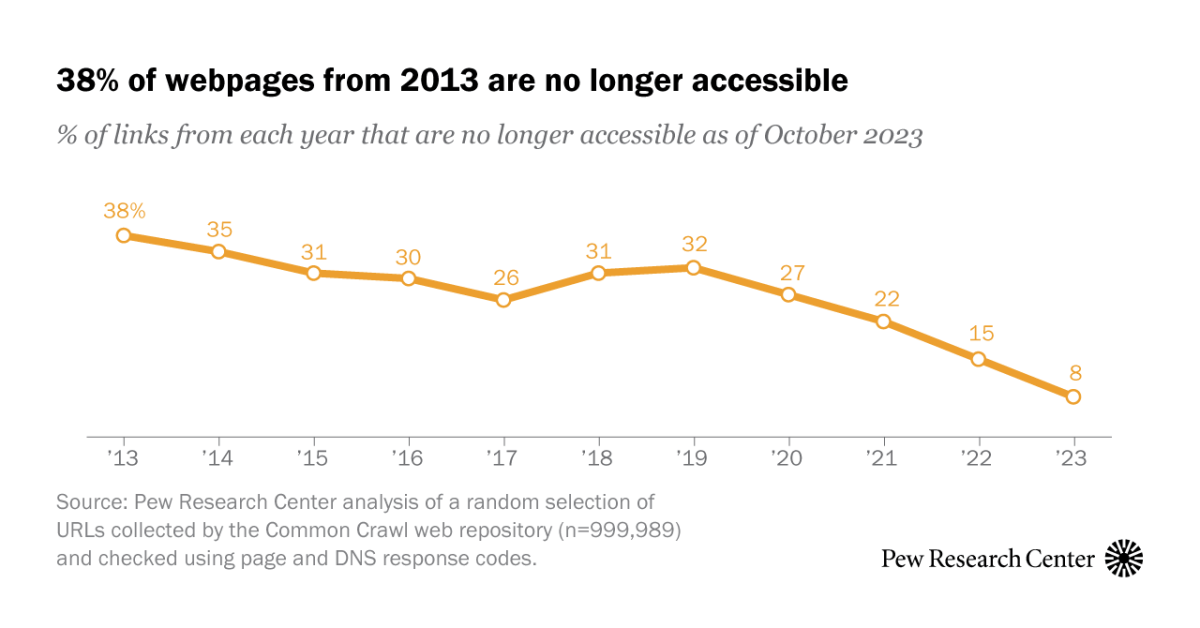Certain types of tweets tend to go away more often than others. More than 40% of tweets written in Turkish or Arabic are no longer visible on the site within three months of being posted.
I’ve read this is a major problem in Facebook as well, they lack good moderation for these languages and especially the Arabic script and so just remove things heavy handedly to be safe.
Donate to the internet archive!
This is important. I signed up a week ago.
deleted by creator
The internet is dying. Everyone knows it. Capitalists ruined it and now AI is propping up a decaying corpse.
That’s an exaggeration. We had nice things back then with forums and ICQ\AIM\others, which we don’t have now, but the tech allows us to have them. It’s the society that has degraded.
I think a lot of stuff got adjusted when mobile became a thing.
Instant message apps just got replaced with Whatsapp, Signal, etc.
Monetisation is a huge problem. Nobody ever expected to make money off a wonky old webpage they made in HoTMetaL, or a MySpace page. Now everyone is on homogenised platforms, they’re quite happy to accept bucketloads of money to project whatever you have to say to the masses, and none of it is good. All the hate you see out there isn’t society. It’s money.
This is the main thing that happened, I think. I met some old friends recently I hadn’t seen in a while and it’s wild how differently we engage with the internet. My main source of interaction is on a laptop, and even then a non-trivial amount of my web interaction is purely via the terminal. Of all of my friends, one of them had a PC, and they don’t use it. Their engagement with the internet is purely on mobile devices. I was dumbfounded. Like…how do you do stuff on a phone. I hate phones. They’re so much worse than a good keyboard. But I also hate the current version of the internet and they seem to love it.
And that, I think, is the core difference. It’s not that the phones took over, it’s that the keyboard died for the average user. A keyboard allows a complex degree of engagement that is difficult, if not truly impossible, to match on a device meant for short bursts of canned responses and auto-complete suggestions. It forces individually brief, but ultimately continuous pre-programmed engagement.
And that’s the entirety of the modern internet. It’s why tiktok is so popular. It’s why youtube shoves Shorts down your throat when you visit. It’s why Twitter took off. It’s also why a website like reddit, that was based initially around the kind of engagement I like, is so hard to monetize and why the attempts at dumbing it down and strangling it of anything that isn’t that same kind of superficial engagement (and by God are they trying) is so difficult for the website’s leadership: because all the other places that are more profitable than it are designed to do that from the jump, and they have to superimpose that strategy onto a content aggregator whose main attraction was a robust, nested comment system.
I keep thinking about what was, for me, the Golden Age of the internet. I know it’s different for everyone, but from around, I guess, 2009 to 2017 I was online a lot. And a lot of what the internet was and how it operated and the ideas there, especially on reddit, were so formative to who I am. And I keep feeling like I never appreciated it or really thought about how vibrant and interesting it was while it was like that. It feels like when you’re a kid and you see a wave for the first time, and it’s building and building and it seems like it’ll be building forever, getting bigger and bigger, but then suddenly it collapses under its own weight and is gone as if it were never there, and after the fact you just wish you’d appreciated it for the wonder it was in that moment. Part of it’s just getting older and the general feeling of nostalgia that comes with age, but sometimes that nostalgia is justified.
I just want to say that you’re absolutely wonderful with words!
Instant message apps just got replaced with Whatsapp, Signal, etc.
Alternately, Whatsapp, Signal, etc… are instant message apps. I’m a little surprised none of the messaging apps that had been popular on PCs managed to stay popular on mobile.
All the hate you see out there isn’t society. It’s money.
I know, right? No matter how rude I am on one forum I still frequent, or in a groupchat of friends, or in family chat, it just dissolves because everybody wants to understand each other. In “global” social media it’s some PvP, as if people didn’t have boxing pears to vent their frustration there.
The technology is working against it too. App search engines are just spam ads now and will never find that niche forum that has what you are looking for, like they once did 20 years ago.
and will never find that niche forum that has what you are looking for, like they once did 20 years ago.
I remember finding them in web directories, populated manually by people, and from people sharing links.
A search engine was the brute force approach, and you’d find something useful after some manual work on 20+ page of results.
Forums are still around. People just got lazy and started using reddit instead. Search engines are also to blame since they don’t bring up smaller forums in search results. People can go back to forums if they want.
Reddit is a forum. If you don’t think so I’m curious to know what differentiates it from one.
That’s the point. One can think what they want, decide and go there. Or one can just leave their home and walk with the crowd wherever it brings them. (A metaphor.)
Social media make it appear like you could live a life like the latter. Doing all things you need. Just walk with the crowd and never decide.
People are afraid of even the tiny bits of freedom, when they are looking at it from that human stream which never leaves them. They think that outside of it, if a decision they make is wrong, they are lost.
It’s psychological, all of it, like a very subtle and less deadly slaughtering block.
The Internet is dead. Long live the Internet!
I’ll have my AI agents talk to your AI agents.
You are trying to reach neo. Please select all the pictures with crosswalks. In order to contact an AI agent instead, you must agree to our data policy.
The Open Web is definitely dying. Some dystopian weaponized ads hellscape of an apps-required shiternet will be around for a while.
In most cases, this is because an individual page was deleted or removed on an otherwise functional website.
How is this news? I bet a lot of pages were also added in the same time frame, very likely orders of magnitude more.
I’ve heard the early Internet age referred to as the future dark ages. When all the work, information and content is digitized, it’s prone to being lost to history forever.
My partner works in historical archiving for science and medicine. Museum work, basically. He’s told me so much of the archives are donated collections of notes, letters, journals, and so on from important doctors, researchers, scientists, etc. Donated by the subject themselves in their later years or by their families.
He’s told me there is a growing issue with those people starting to donate entirely digital collections, but even worse than that, are all the documents that are not being stored on a physical hard drive, but on web services and clouds. By the time these people are willing to start donating their things, so much of it has just been deleted forever without them realizing it. Or worse, they die, and their families no longer have access.
Working in IT, I told him about Microsoft’s growing push to eliminate Outlook and PST files, make it all web based email, and he wasn’t surprised, but he was still bummed to hear it. Apparently a not insignificant amount of those donations are locally stored emails.
Early Internet - yes, but then there’s the middle Internet (or the high Internet if you like, like high Middle Ages) which was in large part scraped by archive.org, and also people generally still knew about offline backups in both eras, and then there’s the late Internet, which moved to siloed services and at the same time most people using it were and are oblivious about preserving data elsewhere. That’s the worst one.
And those added pages were probably just as worthless as the ones they replaced.
Sure a lot of pages of ad infested ads replaced human produced content.
I bet a lot of pages were also added in the same time frame, very likely orders of magnitude more.
No. What you’d make a page for in the 00s, you’d create a FB group or something in the 10s. Hostage to corps and probably too removed for whatever reason.
And not indexed due to crawling bot-decisions
Because those pages had information that wasn’t on the new pages?
Just from my own experience, WotC migrated the Magic the Gathering site to a new one, and while some articles were brought over there were a whole lot of stories, strategies and event coverage that were lost or are only available thanks to Archive.org
I ran across software once that wouldn’t compile properly and the only documentation available was an archive.org hosted backup of an Intel help page that no longer exists. There is no alternative, Intel just removed it entirely.
Yes. The whole post is a trick with statistics. Web pages have a limited lifespan. You can do the aame trick with human life spans.
“50 % of humans that lived 60 years ago are now dead”. You would tweak the numbers to be factual but something like that makes sense to me.
If you only keep the samples you started out with, of course it’s going to decline over time. The data is guaranteed to not grow since nothing is ever added.
That’s pretty interesting. It looks like they define inaccessible links as urls that get a 404 or the server doesn’t resolve.
I wonder if there are any real implications of this. We seem to know it and work around it in some cases, e.g. StackOverflow saying answers need to contain quotes from pages they reference.
For some real-world examples of this issue, you can look at how the only reason we have any of the early BBC news reels and TV shows is because of copies recorded by people on their TVs. The BBC reused the tapes that they recorded on for new programming to save money on buying tapes. When they started to think about the preservation of news and shows like Dr. Who, they had to turn to the general public and ask them to donate any recordings that they might have made.
It’s estimated that more than 50% of all video games are lost forever because companies didn’t care to save a master copy, and this has already come back to bite some of these companies in the ass with the recent trend of remakes and remasters. There was a recent remake of one of the GTA games from the early 2000s that was very poorly received, and it turned out that the company who worked on it only had the mobile phone port of the game to work with because Rockstar hadn’t bothered to keep a master copy of the game. There was another recent remake of a game that was very obviously done using a pirated copy of the game as the source, because they hadn’t even bothered to remove the cracker’s logo from the game.
With examples like that and Sony recently removing thousands of people’s access to music and movies that they bought on basically a whim, it’s pretty clear that preservation efforts will be done in spite of companies rather than helped by them. And so that means copies of things will be one random harddrive failure of some single person on the internet away from disappearing forever.
I’ve nothing really to add but the gta game was San Andreas and Take Two replaced the already functional ports with the mobile version so all that’s available now is the shitey mobile version. I own/owned it on PS4/5 and PC and now I don’t play it at all because if I redownload it I’m getting the mobile version.
Yo ho yo ho a pirate’s life for me
Yeah, just like most material that was ever printed or carved into a clay tablet. It’s the way of things.
The difference is that most of that content lasted for at least a few decades, if not centuries before being lost to time. As content on the internet is ‘destroyed’ if no one hosts it any more, a lot of valuable content is being lost in just a few years after being created. Archiving needs to be more widespread and better supported if the resources and culture of the internet as it has evolved over time are to be preserved for posterity.
Some government should finally grow the balls to reform copyright, it’s insane that basically the whole world uses this broken system that, among other things, makes archiving illegal
The thing is, we can do better, it is not a technological problem as during the analogue/paper age with chemical degradation, it is a societal and legal issue.
There is no practical reason to “do better.” It’s fine.
It’s a technological and a physical issue. We just can’t store every bit of information plus a picture of everyone’s cat. We can’t guarantee that no information ever gets lost. We’ve also not really stored and archived every shopping list, advertising, pamphlet, silly poem, ugly drawing etc. since the time of the printing press and that’s okay.
It might be a good idea to store and archive some written material as time passes but we want to be a bit picky about what we store. That said, I wouldn’t mind to find more shopping lists and less posh documents in museums.
Oh, thank fuck. David Bowie’s Area is still online.
The content isn’t significantly disappearing. It is being consolidated and monetized.
But… they’ve long since figured out how to monetize without the content. So, that’s a hard disagree from me…
God bless archive.org. Fuck the turds trying to bring it down.
Donate and contact your government rep
.
The content isn’t significantly disappearing. It is being consolidated and monetized.
I believe it’s often because nobody does their own website anymore but instead uses managed services, e.g. Medium. Or bits of information, that would’ve been worth a blog post some while ago, end up on sites like StackOverflow, Reddit, etc… And once these services want to monetise these contents, they usually start with limiting public access.
And OTOH TikTok, Instagram Reels and YouTube Shorts are doing everything they can to further limit people’s attention spans and get them addicted to those services. So the people capable of and/or interested in producing proper “content” are dwindling, too.
If Ian’s shoelace site dissapears, I’ma bounce too.
This is why we need the internet archive
You should see it in person. Just drove by it today. Support them!
What do you mean
He means you should see the internet archive in person.
I’ve seen it, but hadn’t realized that it was open to visitors.
Yes. And wikis, too.
We (people in general) have a tendency to share stuff in forums, like Lemmy. That’s fine in the short term, but in the long term this stuff should be sorted, organised, and preferably mirrored. Wikis are perfect for that, while the internet archive is more like “bulk” storage.This is why Discord is poison to our shared pool of knowledge, it’s such a black hole for many games and software (especially ironically enough open source projects) in lieu of decent docs.
Thanks for giving me another bone to pick against Discord ¬¬
Seriously. Fuck Discord.Ugh!
The worst part is, after wasting a bunch of time tracking down the correct Discord server to ask a question about a piece of software, you generally get lambasted by the “regulars” of that server to “just use the search feature, that’s what it’s for!”
Yeah, no. I don’t want to wade through a reverse chronology of a bunch of conflicting back-and-forth conversations - just gimme a FAQ or some actual documentation!!!
Wikis are not really a defense against this issue, they are by nature a secondary or (occasionally by policy) a tertiary source of information. Once the source they are recording dies so does the value of that page on the wiki. From the OP:
54% of Wikipedia pages contain at least one link in their “References” section that points to a page that no longer exists.
There’s nothing intrinsically non-primary in the format. At the end of the day they’re collaborative writing projects, split into pages with internal and external links; it’s just that the biggest one out there happens to be tertiary.
And I believe that they could help a lot with this issue if people migrated/copied meaningful info from forums (like Lemmy) to wikis. Forums are good for discussion, but they tend to accumulate a lot of trash; having the good content sieved and sorted in a wiki makes it more accessible for everyone.
There’s nothing intrinsically non-primary in the format. At the end of the day they’re collaborative writing projects, split into pages with internal and external links; it’s just that the biggest one out there happens to be tertiary.
This is an accurate point. Thanks for the correction. I think what I should have said is that the biggest one has that policy and, as a result, there is a trend of others following suit.
It is more important to archive things you like if you got the space. Even if you don’t plan on using it for a long time.
The biggest crime against shared knowledge ever committed is photobucket fucking off with the pictures in every “how to fix this car problem” forum post.
There’s some old Reddit posts like this too. Advice threads where the person who posted a solution went back and overwrote their comments during the boycott last year. I know why they did it but we still lost some information in the grand scheme of things.
Most of reddit was already archived before: https://the-eye.eu/redarcs/
Also by the Archive Warrior project: https://tracker.archiveteam.org/reddit/#show-all
And that is why I criticized the decisions every time I read about it. Every time I got mixed responses but ultimately got a higher downvote ratio.
Also a reason I participate(d) in the archive warrior reddit project.
And all the “Thanks! Took two minutes to fix after seeing your post” comments just to rub it in.























